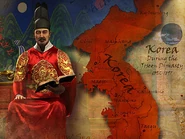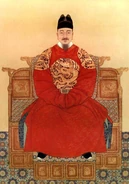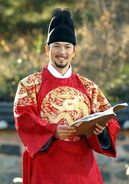Sejong the Great (15 May 1397 – 8 April 1450) was the fourth king of the Joseon (or Choson) Dynasty of Korea. He leads the Koreans in Civilization V.
In-Game[]
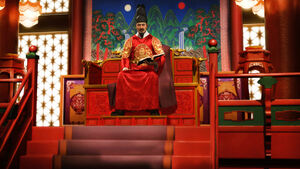
Sejong in game
Sejong speaks Modern Korean with a distinguishable South Korean accent and some archaic vocabulary. (Historically he would have spoken either Middle Korean or Early Modern Korean.) On his diplomacy screen, he is sitting on the Phoenix Throne at Gyeongbokgung Palace with a book in his hands.
Unique Units: Hwach'a, Turtle Ship
Unique Ability: Scholars of the Jade Hall
Voice Actor: Uncredited
AI Traits[]
| Trait | Amount |
|---|---|
| Competitiveness | 6 (8-4) |
| Wonder Competitiveness | 6 (8-4) |
| City-State Influence Competitiveness | 4 (6-2) |
| Boldness | 4 (6-2) |
| Diplobalance | 6 (8-4) |
| Hate Warmongers | 4 (6-2) |
| Willingness to Denounce | 4 (6-2) |
| Willingness to Declare Friendship | 7 (9-5) |
| Loyalty | 7 (9-5) |
| Neediness | 6 (8-4) |
| Forgiveness | 7 (9-5) |
| Chattiness | 4 (6-2) |
| Meanness | 4 (6-2) |
| Offensive Unit Production | 4 (6-2) |
| Defensive Unit Production | 7 (9-5) |
| Defensive Building Production | 6 (8-4) |
| Military Training Buildings Production | 4 (6-2) |
| Recon Unit Production | 3 (5-1) |
| Ranged Unit Production | 7 (9-5) |
| Mobile Unit Production | 5 (7-3) |
| Naval Unit Production | 7 (9-5) |
| Naval Recon Unit Production | 4 (6-2) |
| Air Unit Production | 5 (7-3) |
| Naval Growth | 5 (7-3) |
| Naval Tile Improvements | 5 (7-3) |
| Water Connections | 5 (7-3) |
| Expansion | 5 (7-3) |
| Growth | 6 (8-4) |
| Tile Improvements | 5 (7-3) |
| Infrastructure (Roads) | 5 (7-3) |
| Production Emphasis | 5 (7-3) |
| Gold Emphasis | 5 (7-3) |
| Science Emphasis | 8 (10-6) |
| Culture Emphasis | 5 (7-3) |
| Happiness Emphasis | 5 (7-3) |
| Great People Emphasis | 8 (10-6) |
| Wonder Emphasis | 6 (8-4) |
| Religion Emphasis | 5 (7-3) |
| Diplomacy Victory | 4 (6-2) |
| Spaceship Victory | 8 (10-6) |
| Nuke Production | 6 (8-4) |
| Use of Nukes | 5 (7-3) |
| Use of Espionage | 6 (8-4) |
| Anti-Air Production | 5 (7-3) |
| Air Carrier Production | 5 (7-3) |
| Land Trade Route Emphasis | 5 (7-3) |
| Sea Trade Route Emphasis | 5 (7-3) |
| Archaeology Emphasis | 5 (7-3) |
| Trade Origin Emphasis | 5 (7-3) |
| Trade Destination Emphasis | 5 (7-3) |
| Airlift Emphasis | 5 (7-3) |
| Likeliness to Declare War | 4 (6-2) |
| Likeliness to be Hostile | 3 (5-1) |
| Likeliness to be Deceptive | 4 (6-2) |
| Likeliness to be Guarded | 5 (7-3) |
| Likeliness to be Afraid | 7 (9-5) |
| Likeliness to be Friendly | 6 (8-4) |
| Likeliness to be Neutral | 6 (8-4) |
| Ignore City-States | 6 (8-4) |
| Friendliness to City-States | 6 (8-4) |
| Protection of City-States | 4 (6-2) |
| Conquest of City-States | 3 (5-1) |
| Bullying of City-States | 7 (9-5) |
Personality and Behavior[]
Sejong will usually go for a scientific victory.
Sejong is quite a friendly and loyal leader. He likes to declare friendship and is very willing to forgive transgression. He is quite tolerant, even of warmongers and such.
Sejong places a heavy emphasis on ![]() Science and generating Great People. On some occasions, he may try to build wonders or befriend city-states.
Science and generating Great People. On some occasions, he may try to build wonders or befriend city-states.
Sejong tends to raise a rather small offensive army but a large defensive army, consisting mostly of ranged units. His cities will almost always be well defended. Be very cautious when fighting him on island maps, as his navy will be one of the better ones and his Turtle Ships are good at fending off attacks.
Civilopedia entry[]
History[]
Sejong Daewang, known to history as "Sejong the Great," was the fourth king of the Choson Dynasty of Korea, ruling from 1418 until his death in 1450. Considered by many to be the greatest king in Korean history, Sejong is known for his remarkable appreciation and respect for human life, adopting numerous civic and social policies to improve the well-being of his people. Sejong also encouraged advances in science and technology and is credited with the creation of the Korean written language, Hunminjeongeum, known today as "Hangul."
Early Life[]
Born on May 7, 1397, Sejong was the third son of King Taejong of the Choson Dynasty. Said to have been an exceptional student and avid reader at an early age, Sejong was named Crown Prince at age 16. At age 21, Sejong ascended to the throne, and his impact on Korean life and the kingdom's political structure would be immediate.
Language, Literature and Science[]
Sejong is perhaps most famously known for his introduction of the Korean written language, Hangul. The "Chiphyonjon," or "Hall of Worthies," established in 1420, was a collective of noted scholars selected by the king himself. Initially created as an institute of research, the Chiphyonjon would eventually be tasked with the creation of a Korean alphabet to aid the common people in their understanding of the Korean language. Until this time, Korea had relied on the Chinese "Hanja" script, incorporated into the Korean dialect, for all written works. However, this script was not widely understood by the masses, and Sejong sought to change this trend of illiteracy.
Originally known as "Hunminjeongeum," literally meaning "The Correct Sounds for the Instruction of the People," this native Korean script would usher in a new era of literacy and understanding for the common citizens of Korea. First published in 1446, it would be several years before the new script found wide acceptance. To this day, October 9, the original date of publication, is celebrated as "Hangul Day" throughout South Korea.
The Magnanimous Leader[]
Sejong's legacy is one of great benevolence, led by his strong belief that all people were worthy of his respect, not only the subjects within his kingdom, but even the so-called "barbarian tribes" scattered throughout Asia. The standard by which he measured his own success as a leader was the happiness and prosperity of his people, their welfare being his highest priority. As king, Sejong would provide surplus food supplies to the poor and elderly, and frequently abolished taxes on farmers and occasionally entire provinces that had experienced hardships due to weather or poor crop yields. Sejong was also known for inviting the elderly to banquets in their honor, regardless of the rank or social status of those attending.
Law and the Criminal Justice System[]
Sejong mandated a number of improvements to the Korean justice system in order to provide fair trials and reasonable punishments for the convicted. Sejong believed it was unjust to hold citizens accountable for violating the law without ensuring they were provided a means to understand the laws they had broken. Despite the reluctance of his ministers, Sejong ordered the entirety of the Korean legal code be put on public display, for all to see.
Sejong also opposed the death penalty, and informed judges that it was not to be used unless absolutely necessary. His implementation of "The Law of Three Appeals" allowed the accused up to three appeals to the king, ensuring they were provided with an opportunity to speak on their own behalf.
Military Advancements[]
Under Sejong, Korea began the development of various early gunpowder weapons, most famously the "Hwach'a," or "Fire Vehicle." Specifically designed as an anti-infantry weapon, the Hwach'a was a wheeled platform capable of launching dozens of gunpowder-propelled arrows across the battlefield. Although limited in use during Sejong's time, the Hwach'a would become a crucial defensive weapon throughout the Korean peninsula for centuries to come. During the Battle of Haengju in 1593, three thousand Korean soldiers repelled an invading Japanese force of over 30,000 by successfully utilizing the Hwach'a, inflicting over 10,000 casualties.
Judgment of History[]
In old age, Sejong is said to have continued his involvement in daily routines and government affairs, despite going blind and developing diabetes, which would be the eventual cause of his death on May 18, 1450. Sejong is remembered in history for his wise, noble, and compassionate leadership that spurred amazing advances in science and technology, and led to a revolution in the cultural development of the Korean people for centuries to come.
Trivia[]
- The Republic of Korea Navy employs a class of guided missile destroyers known as "King Sejong the Great," developed under the "Korean Destroyer eXperimental (KDX)" program.
- The likeness of King Sejong the Great appears in Korean currency on the 10,000 Won note.
- A Korean television drama produced in 2008, entitled Daewang Sejong, chronicled the life of Sejong the Great during his reign.
- Designated a UNESCO World Heritage site in 2009, King Sejong's tomb, known as Yeongneung, is located in Gyeonggi-do in present-day South Korea.
Lines[]
| Codename | Quote (English translation) | Quote (Korean) | Notes |
|---|---|---|---|
| Attacked | You poor, miserable wretch. You will be crushed by this country's magnificent scientific power! | 가엾고 딱한 자로다. 이제 이 나라의 과학의 막강한 힘에 짓밟히고 말 것이거늘! / Gayeopgo ttakhan jaroda. Ije i naraeui gwahagui makganghan hime jitbalpigo mal gyeosigeoneul! | |
| Declares War | Jip-hyun-jun will no longer tolerate your irksome behavior. We will liberate the citizens under your oppression even with force, and enlighten them. | 네놈의 성가신 행태를 집현전은 더는 용인하지 않는다. 우리는 무력으로라도 너의 탄압받은 백성을 자유롭게 하고 깨우치게 해 주리라. / Nenomeui seonggasin haengtaereul Jiphyunjeoneun deoneun yonginhaji anneunda. Urineun muryeogeurorado neoeui tanapbadeun baekseongdeureul jayuropge hago kkaeuchige hae jurira. | Jip-hyun-jun (집현전) was a national research institute rather than a state council. This makes this line a little awkward. |
| Defeated | Now the question is who will protect my people. A dark age has come. | 이제 나의 백성들은 누가 지켜준단 말인가. 암흑의 시대가 도래하였구나. / Ije naeui baekseongdeureun nuga jikyeojundan maringa. Ameugeui sidaega doraehayeotguna. | |
| Hate Hello | Oh, it's you. | 네놈이로구나. / Nenomiroguna. | |
| Hate Let's Hear It 01 | What do you wish to say? | 무슨 말이냐? / Museun marinya? | |
| Hate Let's Hear It 02 | So? | 그래서? / Geuraeseo? | |
| Hate Let's Hear It 03 | Continue speaking. | 계속하라. / Gyesokara. | |
| Hate No 01 | Heaven forbid! | 당치도 않다! / Dangchido anta! | |
| Hate No 02 | Crazy talk! | 어림없는 소리! / Eorimeomneun sori! | |
| Hate No 03 | I cannot do that. | 그럴 수 없소. / Geureol su eopso. | |
| Hate Yes 01 | Hm. Very well, fine. | 흠. 그래, 좋다. / Heum. Geurae, jota. | |
| Hate Yes 02 | I suppose I should agree/do that. | 그리해야 하겠지. / Geurihaeya hagetji. | |
| Hate Yes 03 | That is very good. | 아주 좋소. / Aju jotso. | |
| Intro | Welcome to the palace of Choson, stranger. I am the learned King Sejong, who looks after his great people. | 조선의 궁궐에 당도한 것을 환영하오, 낯선이여. 나는 나의 훌륭한 백성들을 굽어 살피는 깨우친 임금 세종이오. / Joseoneui gunggwore dangdohan geoseul hwanyeonghao natseon iyeo. Naneun Naeui hulyunghan baekseongdeureul gubeo salpineun kkaeuchin imgeum Sejongio. | Sejong was a temple name. These names were given posthumously, so Sejong couldn't have called himself by that name. |
| Neutral Hello | Hello. | 안녕하시오. / Annyeonghasio. | |
| Neutral Let's Hear It 01 | I will hear it. | 들어보겠소. / Deureobogetso. | |
| Neutral Let's Hear It 02 | Go on. | 계속해 보시오. / Gyeosoke bosio. | |
| Neutral Let's Hear It 03 | Continue. | 하여. / Hayeo. | This is an ancient expression. |
| Neutral No 01 | I cannot do that. | 그리할 수 없소. / Geurihal su eopso. | |
| Neutral No 02 | I will not do that. | 아니하겠소. / Anihagetso. | |
| Neutral No 03 | I will not accept it. | 사양하겠소. / Sayanghagetso. | |
| Neutral Yes 01 | That is good. | 좋소. / Jotso. | |
| Neutral Yes 02 | I understand. | 알겠소. / Algetso. | |
| Neutral Yes 03 | Of course. | 물론이오. / Mullonio. | |
| Peaceful | How can it be this way? What strategies did you implement? | 어찌 이럴 수가? 어떠한 전략을 운영한 것이냐? / Eojji ireolsuga? Eotteohan jeollageul unyeonghan geosinya? | |
| Request | Comrades, we have many things to discuss and have much to benefit from each other. | 동지여, 우리는 상의해야 할 것이 많고, 서로에게 얻을 수 있는 것이 많소. / Dongjiyeo, urineun sangeuihaeyahal geosi manko, seoroege eodeul su itneun geosi manso. |
Intro[]
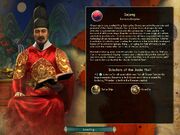
Greetings to you, exalted King Sejong the Great, servant to the people and protector of the Choson Dynasty! Your glorious vision of prosperity and overwhelming benevolence towards the common man made you the most beloved of all Korean kings. From the earliest days of your reign, the effort you took to provide a fair and just society for all was surpassed only by the technological advances spurred onwards by your unquenched thirst for knowledge. Guided by your wisdom, the scholars of the Jade Hall developed Korea's first written language, Hangul, bringing the light of literature and science to the masses after centuries of literary darkness.
Honorable Sejong, once more the people look to you for guidance. Will you rise to the occasion, bringing harmony and understanding to the people? Can you once again advance your kingdom's standing to such wondrous heights? Can you build a civilization that stands the test of time?
Gallery[]
See also[]
- Sejong in other games
| Civilization V Leaders [edit] |
|---|
| Ahmad al-Mansur |
| 1 Requires a DLC
|


